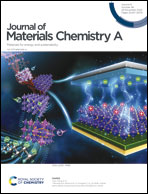Highly effective and selective molecular nanowire catalysts for hydrogen and ammonia synthesis†
Abstract
New types of electrocatalysts with high activity and selectivity are essential for advancing sustainable hydrogen and ammonia productions. Herein, through extensive first-principles calculations, we systematically investigated the potential of molecular nanowires (i.e., transition metal-phthalocyanine and transition metal-porphyrin nanowires), a broadly studied and experimentally synthesized class of frameworks as electrocatalysts for hydrogen and ammonia production. Our computations reveal that among the 20 candidate systems, Co-phthalocyanine/porphyrin nanowires are found to be the superior electrocatalysts for HER, while Ti-porphyrin and Mo-phthalocyanine/porphyrin nanowires exhibit excellent NRR activity with high selectivity and efficiency. Such catalytic activities primarily correlate to the electronic configurations of their d orbitals. Our study not only extends the electrocatalysis to molecular nanowire systems for the first time but also provides a design principle for accelerating the search for molecular nanowire catalysts.



 Please wait while we load your content...
Please wait while we load your content...